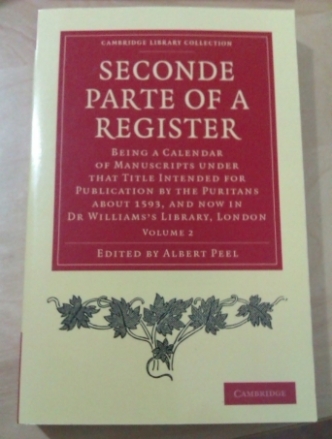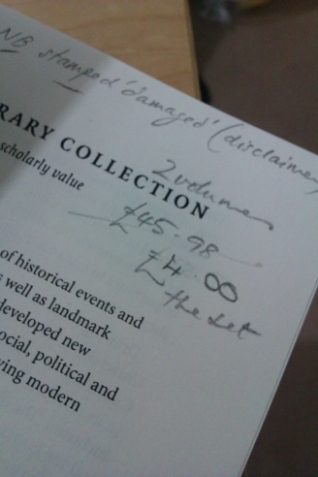So, while out yesterday and visiting old churches in Cambridge, I was showing visiting relatives St Edward King and Martyr, which as the observant will know is right next to G. David (which, since the original David was French, might actually be “Da-VEED,” I guess? Whatever). And that is where I got these:
That’s both volumes of Seconde Parte of a Register: Being a calendar of manuscripts under that title intended for publication by the Puritans about 1593, and now in Dr Williams’s library, London. Marked down from £45.98 to £4.00 the pair. And they are delightful.
Some context: following the Reformation, not all English Protestants were on the same page regarding exactly how Protestant they wanted to be. The Puritans, in particular, were disappointed with the Church of England, which they saw as riddled with flaws: corrupt and nepotistic, way too close to Catholicism in some cases, uninterested in serving its congregations, and all in all basically a sinecure for educated loafers, or even uneducated ones. This didn’t go down well with the authorities, naturally, for whom uniformity was a vital part of making this whole Church of England thing work. From the safety of Scotland, a team of Puritan writers put together loads of documents intended to help them make their case, and these are some of them.
Among these documents are a series of what I can only call shit lists: long rolls of clergy that the Puritans think aren’t up to their jobs, either because they never actually preach (not uncommon), because they don’t know anything about religion and are therefore not able to preach, or because they are terrible people who set a bad example. Since who got to be vicar (or parson or whatever) was neither up to the church nor up to the congregation, some right oddballs got in, at least to hear the Puritans tell it.
Anyway, without further ado, some highlights from the roll of infamy:
- Mr Lucking, v. of Takeley; he is one that can not preach the Worde of God truelie and soundlie, for which he was constrainted to recant his errors openly. Yet he continueth falsifieing and corrupting the Scripture.
- Mr French, pa. of Birchhanger, a verie insufficient and carelesse minister, a gamster.
- Mr Levit, pa. of Leden Roding, a notorious swearer, a dicer, a carder, a hawker and hunter, a verie careles person, he had a childe by a maid since he was instituted and inducted; he is a quarreller and fighter, for he quarelled with the pa. of Stoke in a common inne in Chelmsford.
- Mr Thomison, v. of Little Canfield, is a gamster and an alehouse haunter, and such a one as useth a verie loose life, frequenting the companie of vaine men.
- Mr Palmer, pa. of Widford, heretofore a serving man or souldier, a gamster and pot companion, he received into his house a strumpet, who was brought to bed there, which was done to save her from punishment, himself was called before the spirituall court for the same; he allso usuallie marieth unknown persons without anie banes.
- Mr Phippe, v. of Barling. Sometime a sadler by occupation, convicted of whoredome, who kept a whore long time in his house, a man far unable to preach.
- Mr Mercer, c. of Little Wakering, a drunckard.
- Mr Dowell, v. of Little Wakering, drunckard and alehouse haunter.
- Mr Hales, v. of Witham, incontinent.
- Mr Arkins, c. of Romford, thrice presented for a drunkard.
- Mr Newton of Little Ilford, a great drunckard.
- Mr Fearnes, pa. of Sanden, heretofore a frier, now a careless minister, doth not prech, indicted and found a common barratour.
A common barratour. I have no shame in telling you I have no idea what that means. And that’s just a handful of the hundreds of entries for Essex alone.
Now, I have taken several things out of this. The first, sadly, is that “presented to the spirituall court” just means banged up on a religious charge, like what’s-her-face the Essex witch trial defendant, and not some weird mystical rite. So I guess her comments now make more sense in context, disappointingly. The second is that Mr Mercer and Mr Dowell probably had some good old times together, because of their shared interest. The third is that there is actually something in Birchanger other than a motorway services, which I was unaware of.
Of the ones I haven’t cited, I find it interesting that Mr Bambridge of Brackstead is an alehouse-haunter and a companion of drunkards (not to mention a grosse abuser of the Scriptures) but apparently not himself a drunkard, because you’d think they’d have mentioned it. That seems very fair of them. I can just imagine some committee of Puritans debating that one. “You think we can get away with drunkard?” Also, Mr Glibberie of Halesteed is “a verie ridiculous preacher” which is hardly surprising given his name.
I have only scratched the surface of the contempt in this book, although the first volume seems like it contains less open hilarity. But for £4 I think I have done pretty well.
The thing … the main thing … is that I sort of wonder how much record there is of Mr Glibberie, historically. It is a funny thought that the entirety of your contribution to the historical record might be that some hard-ass Puritans thought you were verie ridiculous. I’m sure someone could look it up, but I’m too lazy


The common barratour was a vexatious litigant – it was an offence under the common law.
Yes! Friend of the blog Chris pointed this out to me just now. Great minds.
[…] by some 16th-century Puritans as “a verie ridiculous preacher.” I mentioned him in an earlier Invective Through the Ages post. At the time, I wondered if there were any other information out there on poor Mr Glibberie. […]